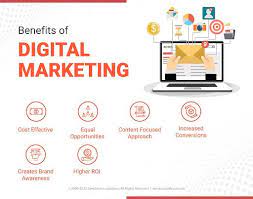In today’s digital age, data analytics has become an essential tool for businesses to measure and optimize their digital marketing efforts. By analyzing data from various sources, digital marketers can gain valuable insights into their target audience, track campaign performance, and make data-driven decisions to improve their marketing strategies. In this article, we’ll explore the importance of analytics in digital marketing and some key concepts covered in a digital marketing course.
Why Is Analytics Essential in Digital Marketing?
Analytics plays a critical role in digital marketing because it helps marketers make informed decisions about how to allocate their resources and optimize their strategies. By collecting and analyzing data from various sources, such as website traffic, social media engagement, and email marketing campaigns, marketers can gain a deeper understanding of their target audience’s behavior and preferences.
Some of the key benefits of using analytics in digital marketing include:
Improved ROI: Analytics can help marketers track the performance of their campaigns and identify areas for improvement, which can lead to higher returns on investment (ROI).
Also Read: Most important on-page element for SEO to boost rankings
Better Targeting: Analytics can provide insights into audience demographics and behavior, allowing marketers to tailor their messaging and targeting to specific segments.
Increased Engagement: Analytics can help marketers identify which types of content and messaging are resonating with their audience, leading to higher engagement rates.
Enhanced Personalization: By analyzing data on customer behavior and preferences, marketers can personalize their messaging and offers, improving the overall customer experience.
Key Analytics Concepts in Digital Marketing
There are several key concepts that digital marketers should understand when it comes to analytics. These include:
Data Collection: The first step in using analytics is to collect data from various sources, such as website analytics tools, social media platforms, and email marketing software.
Key Performance Indicators (KPIs): KPIs are metrics used to measure the success of a digital marketing campaign, such as website traffic, social media engagement, and conversion rates.
Data Analysis: Once data is collected, it needs to be analyzed to gain insights into audience behavior and campaign performance. This involves using tools such as data visualization and statistical analysis software to identify patterns and trends.
A/B Testing: A/B testing involves comparing two versions of a marketing campaign to determine which performs better. This can be used to optimize various elements of a campaign, such as messaging, imagery, and calls-to-action.
Attribution Modeling: Attribution modeling is a way of assigning credit to various marketing touchpoints for a customer’s conversion. This can help marketers understand which channels and campaigns are driving the most conversions and allocate their resources accordingly.
Predictive Analytics: Predictive analytics uses data modeling and machine learning algorithms to make predictions about future customer behavior and campaign performance.
Digital Marketing Courses and Analytics
To fully understand the importance of analytics in digital marketing and how to apply these concepts, it’s essential to take a digital marketing course that covers analytics in-depth. These courses typically cover topics such as data collection, KPIs, data analysis, A/B testing, attribution modeling, and predictive analytics.
In a Digital Marketing Course In Patna, students will typically learn how to use analytics tools such as Google Analytics, social media analytics platforms, and email marketing software. They will also learn how to interpret data and use it to inform marketing strategies, such as creating targeted campaigns and optimizing website design and user experience.
Additionally, digital marketing courses often include practical assignments and projects that allow students to apply their analytics skills to real-world scenarios. This can include creating a data-driven marketing plan, conducting A/B testing, and developing predictive models.
Conclusion:
Analytics is an essential tool for digital marketers to measure and optimize their campaigns’ performance. By collecting and analyzing data from various sources, digital marketers can gain valuable insights into their target audience’s behavior and preferences, track campaign performance.
